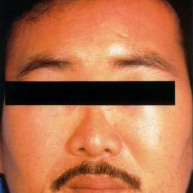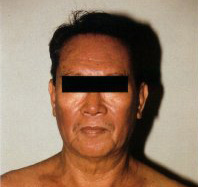Hair cosmetics (hair-dyes):

Hair-dye allergy is one of the commonest causes of cosmetic dermatitis in men and women. Some individuals are able to dye their hair initially without any problem, but may suddenly develop an allergy to the dye after repeated dyeing of hair. The face, ears and neck are often affected. (Fig. 5) The substance that often causes an allergy to hair-dye is para-phenylenediamine (PPD). It can be found in almost all brands of permanent hair dyes. Those who are allergic to PPD hair dyes must avoid all synthetic chemical hair dyes. The only suitable substitute here is Henna vegetable dye or metal pigment dyes.
Sunscreens allergy:

Sunscreens protect our skin from sun damage. However it can also cause skin problems.
Besides being sold commercially as sun-blocking agents, they are also incorporated into numerous cosmetic products, like lipsticks and facial foundation.
Sunscreens can cause irritant contact dermatitis, allergic contact dermatitis and also photo-allergic contact dermatitis. Photo-allergic dermatitis differs from allergic contact dermatitis, as the rash occurs only after the skin comes into direct exposure with the combination of the allergic substance and sunlight. (Fig. 6)
All chemical sunscreens have the potential of causing photo-allergic dermatitis. Physical sunscreen, like titanium dioxide, does not cause this problem.
You should consult a dermatologist for skin patch test if you suspect that you have sunscreen allergy. After the patch test, your dermatologist should be able to advise you on the type of sunscreen that you can use.